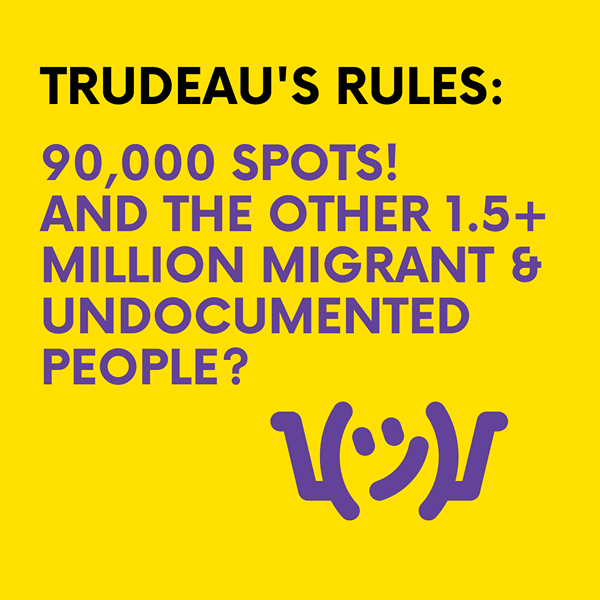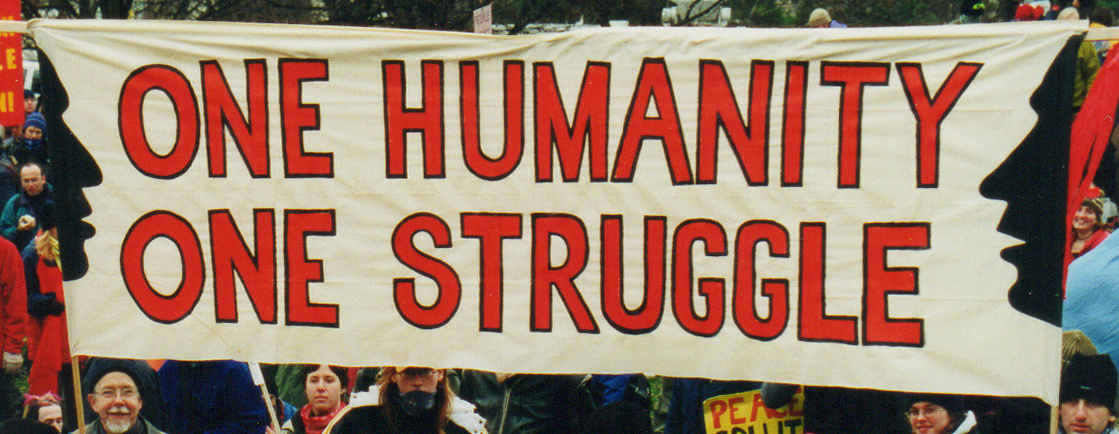One of the main
achievements of the government
of Pierre Elliot Trudeau, and of Trudeau himself, was to enshrine what
is called the mobility of labour as a Charter right. As a result, the
mobility of labour is one of our fundamental rights in Canada according
to which a person has the right to travel anywhere to get a job
-- and it was finally enshrined in the Charter of Rights and
Freedoms in 1982.
 Workers
have the "right" to move all over the world to work, as if people want
to leave their homes to make a living instead of having a protected
right to have a livelihood, food, housing, health care and an
education, in their countries and places of origin. And then, after
enshrining the mobility of labour as a Charter right, the official
circles
treat working in Canada as a privilege. According to them, Canada is
the best country in the world to live and work so people should feel
grateful, obey the rules, Put Up and Shut Up.
Workers
have the "right" to move all over the world to work, as if people want
to leave their homes to make a living instead of having a protected
right to have a livelihood, food, housing, health care and an
education, in their countries and places of origin. And then, after
enshrining the mobility of labour as a Charter right, the official
circles
treat working in Canada as a privilege. According to them, Canada is
the best country in the world to live and work so people should feel
grateful, obey the rules, Put Up and Shut Up.
The
point is not whether Canada is or is not the best country in which to
live and work, or to compare Canada to war-torn countries or countries
wracked with poverty and misery as a result of imperialist exploitation
and oppression. Such comparisons are diversionary because they do not
get to the heart of the matter in any way which is to
one's advantage. The self-serving side of the programs organized by the
government of Canada is such that they serve the biggest corporations
on the backs of the people. By forcing everyone to fend for themselves,
they also aim to divert the working people from fighting for the rights
of all under all conditions and circumstances and to set a new
direction for the economy.
Since the neo-liberal
anti-social offensive was launched in the
early 1990s, the way that labour in the world has been structured has
changed.
Workers have seen the introduction of two
tier wages and different
strokes for different folks such as benefits and defined benefit
pension plans tolerated for older workers, but not new hires -- in
steel, forestry, transportation, communications and all sectors of the
economy where government makes sure corporations are protected while
the
working people are criminalized and considered disposable. The valiant
battle waged by workers at Telus and Bell Canada strongly opposed
corporations closing down, recreating themselves under new names and
hiring workers, especially women, back at half the wages. So too at the
post office where workers are kept for years on contracts only,
as is also the case in colleges and universities. While work in the
public sector is more and more privatized, remaining positions are left
unfilled to force people to turn to the private sector for services and
jobs.
Today, more and more contract labour has
replaced permanent
employment and unions are either under the dictate that there are no
negotiations or there are to be no unions, just workers as associates
who must accept the dictate of the corporations or lose their jobs.
Within this framework, we have huge migrations of peoples on
the
global scale, much of it as a result of the wars of aggression and
occupation or brutal sanctions regimes as we see today against
Venezuela. Overall, the estimated number of international migrants has
increased from 153 million in 1990 to an estimated 272 million in 2019.
Of
that 272 million, 70 per cent are migrant workers.
 Key
sectors of our economy depend upon migrant workers and the product of
their labour is not even necessarily for Canadian consumption but for
export which provides immense profits for huge corporations. Fruit and
vegetable
production which is concentrated in Ontario and Quebec is one example.
Temporary foreign migrant workers account for 41.6 percent of the
labour involved in Ontario and 30 per cent in Quebec. They produce
$1.047 billion in field vegetables, of which $729.3 million is for
export to the U.S. They produce $1.53 billion in green house farm
production in Ontario, British Columbia, and Quebec, $1.18 billion of
which is exported to the U.S. The same is true of Canada's fruit
production,
64.8 per cent of which is exported to the U.S., valued at $546.1
million.
Key
sectors of our economy depend upon migrant workers and the product of
their labour is not even necessarily for Canadian consumption but for
export which provides immense profits for huge corporations. Fruit and
vegetable
production which is concentrated in Ontario and Quebec is one example.
Temporary foreign migrant workers account for 41.6 percent of the
labour involved in Ontario and 30 per cent in Quebec. They produce
$1.047 billion in field vegetables, of which $729.3 million is for
export to the U.S. They produce $1.53 billion in green house farm
production in Ontario, British Columbia, and Quebec, $1.18 billion of
which is exported to the U.S. The same is true of Canada's fruit
production,
64.8 per cent of which is exported to the U.S., valued at $546.1
million.
Canada has created a sophisticated system
of arrangements with
governments of impoverished countries to supply cheap labour. It is all
said to be legal, but the legality covers up that it is prone to
parasites and corrupt elements involved in what can only be called
human trafficking. In fact, conditions are created for
human
traffickers involved in corrupt schemes who prey on vulnerable people.
Even Canada's consular services abroad are engaged in the recruitment
of labour and students who pay vast sums for visas. This spawns all
kinds of recruiters and agents who take their money for services
rendered to get them these visas. They operate with impunity within and
beyond the legal margins of government programs and the government
plays coy. It pretends it is not taking place and turns a blind eye
while the narrow private interests it serves get rich from the
contracts the government itself awards to temp agencies or recruitment
services. The Canadian government itself makes money off of human
trafficking
while maintaining contract workers, visa workers, visiting guest
workers and new immigrants as well as undocumented workers in the most
vulnerable positions.
The Migrant Rights Network
issued a report based on extensive
interviews with more than 450 migrant farmworkers in Ontario. The
government is supposed to monitor their living and working conditions,
but does not. It takes no action in the face of concrete facts, or it
finds a way to say that the law does not apply to it and it is not
responsible. The workers cited a lack of clean drinking water, lack of
indoor bathrooms, no hot water for showers, cramped living conditions
contributing to spread of infection, dangerous working conditions and
being victimized for standing up for their rights. One worker called it
modern-day slavery.
The government of Canada takes
its cue from the United States where
the Supreme Court recently brought down a decision against the farm
workers' right to organize by deciding that the Unions cannot have
access to privately owned farms as it "trespasses on private property
rights." It is another example of the offensive of agribusiness
against the working people.
Canada "imports"
213,700 temporary foreign migrants like the farm
workers the Migrant Rights Network interviewed, every year, on work
permits tied to a single specific employer. This system creates the
conditions that make people vulnerable to forced labour.
 One
case came to light in 2019 of 43 victims, mostly men from Mexico aged
20-46, who were living in squalid conditions in Barrie, Ontario and
were being trafficked to work for a cleaning company. With the trend
towards contracting out to agencies, the end users of trafficked
workers can be the most "respectable" and "civilized" of
institutions: art galleries, museums and other government institutions,
that today rely on agencies for many services, like the cleaning
company in Barrie. Similar cases have come to light in Nova Scotia and
elsewhere.
One
case came to light in 2019 of 43 victims, mostly men from Mexico aged
20-46, who were living in squalid conditions in Barrie, Ontario and
were being trafficked to work for a cleaning company. With the trend
towards contracting out to agencies, the end users of trafficked
workers can be the most "respectable" and "civilized" of
institutions: art galleries, museums and other government institutions,
that today rely on agencies for many services, like the cleaning
company in Barrie. Similar cases have come to light in Nova Scotia and
elsewhere.
There is no protection of workers' human
rights. The only reference to trafficked persons in the Immigration
and Refugee Protection Act is
to make the fact that a person is being trafficked a factor for
immigration detention of the victim. Less than one third of human
trafficking cases ever go to court. Convictions for traffickers are
very
rare but deportation of the victims is certain.
Through
their actions in defence of the rights of all, workers are
shedding light on their experiences and the fights being waged in
defence of rights. They can see the urgency of mobilizing Canadians and
Quebeckers to demand status for all.
Today, when
the Justin Trudeau government talks about maximum
flexibility and maximum mobility of labour, it means that nothing
should obstruct the race for domination of the global oligopolies
within the sphere of influence of the imperialist system of states led
by the U.S., to be number one in the global markets. Nothing must
hinder
this -- no law, no regulation that hinders the empire-building of these
monopolies nor their neo-liberal free trade treaties such as the
neo-liberal reorganized NAFTA, or Trans-Pacific Partnership or the free
trade agreement with the European Union or with the U.S. -led war
alliances. Maximum labour mobility is an essential element of this
maximum flexibility, and the claim is made that rules that still attach
workers to an economic sector or region should be abolished as
obstacles to the growth of the economy.
Capitalism
on the world scale has always demanded that all obstacles
to its expansion and power be abolished. However, with neo-liberal
globalization this has been on steroids as a result of the explosion of
the productive powers which the rich cannot control. Any form of social
programs and fetters to the mobility of labour and capital are to
be removed. But this also means that the working class on the global
scale has literally become one, learning from one another's struggles,
uniting in action to humanize the natural and social environment. The
conditions have changed and the issue is to resolve the problems in a
manner which favours the working class, not the super-rich elites
who comprise one per cent, and governments in their service whose
primary role is to perpetuate their rule.
It is
thanks to the struggles of the workers and compatriots of
those who come here from other countries and support from Canadians of
all walks of life that a human approach is taken to providing for the
well-being of the most vulnerable workers. They do not agree that
everyone should be left to fend for themselves. Under pandemic
conditions, many have died but even without pandemic conditions, the
conditions of life and work are inhuman, untenable, and unsustainable.
The toll they take on the workers and their families in terms of stress
and strain to their mental and physical health and that of their
families is unacceptable. This fight has just begun all over again. The
efforts of all those who are fighting so hard to right these historical
wrongs is invaluable.


The next issue of Workers' Forum will be
published on August 2. For the month of July matters of concern will be
covered as part of the In the News section of
CPC(M-L)'s homepage and coming events will also be advertised on the
website.
Please continue to send us your reports,
photos and comments.
Readers are also encouraged to support the work of the Workers' Centre
of CPC(M-L) by joining us in increasing the readership of Workers'
Forum and by making a financial contribution.
Have
yourselves a good summer and keep safe!
Workers'
Forum Editorial and Technical Staff
June 30, 2021

